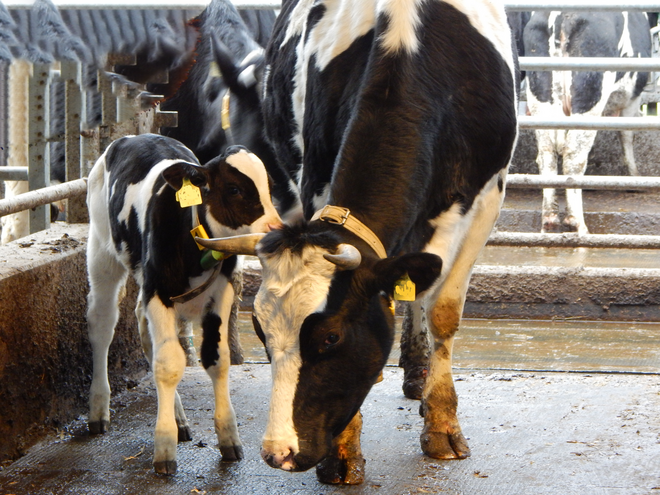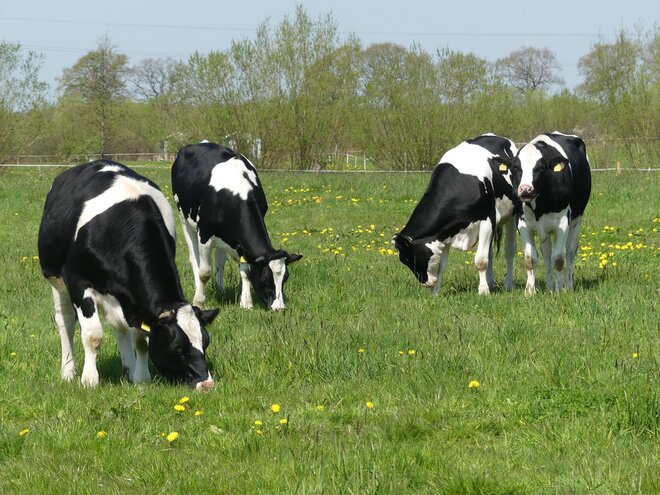Project
InnoRind - Cattle Innovation Network – sustainable cattle farming in Germany
![[Translate to English:]](/media/_processed_/d/7/csm_Logo_InnoRind_0d42648803.jpg)
InnoRind - Cattle Innovation Network – sustainable cattle farming in Germany, considering animal welfare, environmental impacts and social acceptance

What does sustainable cattle farming in Germany look like, considering animal welfare, environmental impact and social acceptance? What changes can be implemented in housing and management of calves, beef and dairy cows? Answers to these questions are to be provided by nine research farms as part of the InnoRind project.
Background and Objective
The aim of the project InnoRind is to improve animal welfare and thus social acceptance of cattle farming in Germany through practical and scientific evaluation of innovative housing and husbandry measures. Knowledge transfer into practice rounds off the project.
The Thünen Institute of Organic Agriculture participates in various InnoRind sub-projects.
In the subproject "Mother-bound calf rearing", investigations are carried out to reduce weaning stress in mother-bound calf rearing. Background: Nowadays, consumers want more animal-friendly husbandry. In dairy farming, the early separation of calves from their mothers is often criticized. In mother-bound rearing, the calves are cared for by their own mothers in the first months of life. However, the subsequent separation of the pair also brings stress for the animals. The main goal of the project is to develop separation method that lower stress as possible.
The project "innovative management systems in beef cattle production" evaluates the grass-fed (pasture-based) fattening of male offspring from dairy cattle under organic farming conditions within a silvopastoral management system. In dairy farming, besides milk and young animals for remontation, also calves for meat production are raised as a by-product. However, their ecological and economic advantages have not been fully exploited to date, even in organic farming. Furthermore, the current handling and management practices of these animals has repeatedly been subject of public criticism.
In the sub-project "Animal Welfare Planning", a preventively oriented management concept for structured and systematic animal welfare planning will be developed for practice. It can be used in cattle farms to continuously improve and ensure animal welfare. Background: Many so-called "production diseases" in cattle farming, such as lameness, udder and metabolic disorders, have a high relevance to animal welfare, as they are usually associated with pain and/or suffering. Practical research has shown that various problems that affect animal welfare occur very frequently. A crucial role in ensuring and maintaining the welfare of farm animals is the effective prevention of health disorders and other animal welfare problems.
Additionally, the Thünen Institute evaluates the animal welfare situation in all innovation projects of the joint project.
Approach
In the project "Mother-bound calf rearing", a "smart" gate monitors the calf's access to the cow's area. When the calf enters this gate, it is either allowed to visit its mother or must return to the calf area, depending on its age and time of day. Similar to the situation under natural conditions, the contact between the cow and her aging calf can be gradually reduced until the two are finally completely separated. We will see if this Slow and gradual reduction of the contact time will be tested to look at the easiness they bring in the separation of the cow-calf pair.
Three groups of calves go through different weaning processes in the 3rd month of life. For the calves that did not have access to their mothers (group 1), the amount of milk available at the milk feeder decreases daily. For the other calves, that are in contact with cows, the time that the calves can spend with their mothers is monitored by a "smart" gate. The access time to the cow area is reduced either by half an hour per day (group 2) or by 3.5 hours per week (group 3). The behaviour of the animals under these different conditions is observed and compared.
Within the project "innovative management systems in beef cattle production", two different types of pasture-based beef production will be evaluated. One group of cattle will undergo a conventional pasture-based finishing procedure, while a second group will be given additional access to hedges (mainly Salix sp.). Besides the recording of carcass characteristics, data on the well-being of the animals, including their health, are collected. Thereby, the data acquisition is supported by the use of various sensor systems (rumen-boli, camera monitoring and pedometer).
In the project "Animal Welfare Planning", the Thünen Institute of Organic Agriculture describes and develops the management concept for animal welfare planning in a target group-oriented and comprehensible way. This concept, which supports the establishment of a continuous improvement system, consists of a control loop with steps that build on each other. Evidence-based knowledge on measuring and evaluation of the animal welfare situation in cattle farms is available, as well as on the prevention of various problems affecting animal welfare, such as production diseases. The concept of animal welfare planning is explained and made available as a written guide as well as in digital form. existing tools usable for animal welfare planning are made available to the public in a modular structured digital platform.
Within the framework of the cross-cutting topic "Animal Welfare", theanimal welfare situation in all innovation projects of the joint project "InnoRind" is evaluated. For this purpose, animal-related indicators are recorded on the research farms, which are primarily based on the standardised methods and flow charts of the publication "Animal Welfare Indicators: Guidelines for Practice – Cattle" (Brinkmann et al., 2020a). The evaluation of the individual animal welfare situation is based on existing reference values (DLQ, 2020; Brinkmann et al., 2020b) as well as on vertical benchmarking, i.e. comparison of the results of the animal welfare surveys in each experimental setting at different points in the course of the project.
Thünen-Contact

Involved Thünen-Partners
- Barth, KerstinOL Institute of Organic Farming
- Deblitz, ClausBW Institute of Farm Economics
- Edebohls, ImkeBW Institute of Farm Economics
- Gillet, RomaneOL Institute of Organic Farming
- Krebs, TonyOL Institute of Organic Farming
- March, SolveigOL Institute of Organic Farming
- Peschel, UlrikeOL Institute of Organic Farming
- Zavyalova, KatharinaBW Institute of Farm Economics
Funding Body
-
Federal Ministry of Agriculture, Food and Regional Identity (BMLEH)
(national, öffentlich) -
Federal Office for Agriculture and Food (BLE)
(national, öffentlich)
Duration
5.2021 - 1.2026
More Information
Project funding number: 28N-3-042-09
Project status:
ongoing
Publications
- 0
Peschel U, March S, Brinkmann J (2026) Tierwohlplanung : SEHEN - VERSTEHEN - VERBESSERN ; Mehr Tierwohl durch proaktives Herdenmanagement [online]. Trenthorst: Thünen-Institut für Ökologischen Landbau, zu finden in <https://www.tierwohlplanung.de> [zitiert am 22.01.2026]
- 1
Krebs T, Boldt A, Wulf R, Maak S, Barth K (2025) Fattening of German Holstein steers in a silvopastoral system. Book of Abstracts Ann Meet EAAP 39: 507
- 2
Peschel U, March S, Brinkmann J (2025) Tierwohlplanung - ein Managementkonzept zur Verbesserung des Tierwohls in der Praxis : Empfehlungen aus der Wissenschaft und Erfahrungen aus der Praxis. Trenthorst: Thünen-Institut für Ökologischen Landbau, 44 p, Thünen Ratgeber 9, DOI:10.3220/253-2025-67
- 3
Peschel U, Brinkmann J, Ivemeyer S, Leeb C, March S (2024) Workshop: Präventiv orientiertes Tierwohlmanagement in der Praxis unterstützen. In: Bruder V, Röder-Dreher U, Breuer L, Herzig C, Gattinger A (eds) Landwirtschaft und Ernährung - Transformation macht nur gemeinsam Sinn : 17. Wissenschaftstagung Ökologischer Landbau, 5.-8. März 2024, Justus-Liebig-Universität Gießen ; Tagungsband. 1. Auflage. Frankfurt am Main: FiBL Deutschland eV, pp 348-349, DOI:10.5281/zenodo.11204339
- 4
Krebs T, Boldt A, Wulf R, Maak S, Barth K (2023) Erste Ergebnisse zur Mast von Ochsen der Rasse Deutsche Holstein in einem silvopastoralen Haltungssystem. In: Tagungsband der Vortragstagung der Deutschen Gesellschaft für Züchtungskunde e.V. (DGfZ) und der Gesellschaft für Tierzuchtwissenschaften e.V. (GfT) : Aus der Arbeit der Forschungsstätten für Tierwissenschaften ; 13./14. September 2023, Universität Halle-Wittenberg. p D14

![[Translate to English:] [Translate to English:]](/media/_processed_/8/e/csm_Bildschirmfoto_2021-03-03_bearb_fc48ac88bf.jpeg)
![[Translate to English:] [Translate to English:]](/media/_processed_/8/e/csm_Bildschirmfoto_2021-03-03_bearb_ba3ec0e9d7.jpeg)







